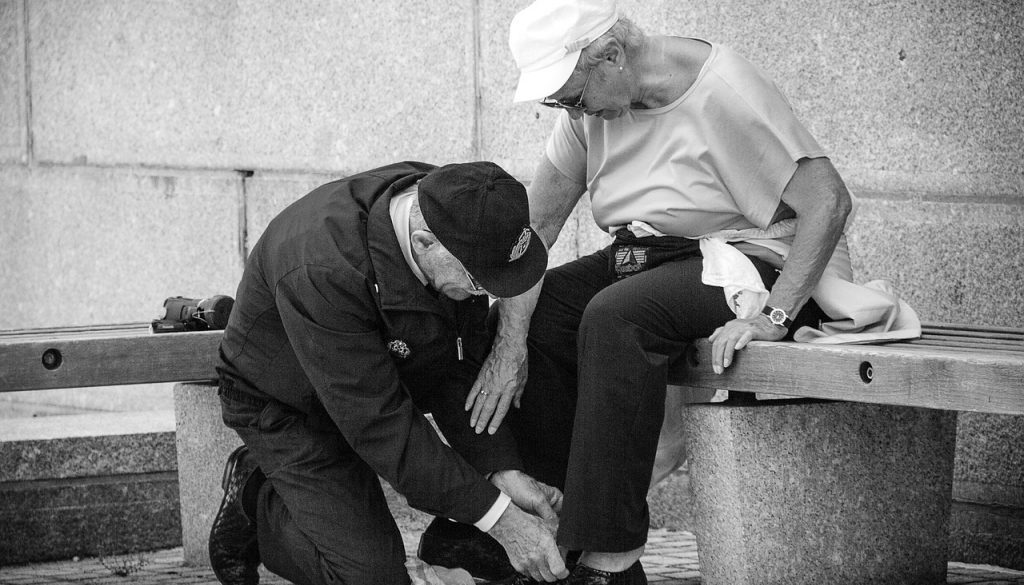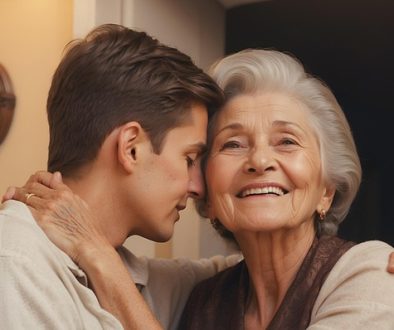Inside the Mind of a Care Partner
By Maureen Rulison
It’s early morning. I’m up and moving quickly. Brian is still asleep. “Good,” I say quietly. “He had a rough one yesterday.” And I then remember he’s been in a brain fog for the better part of four days. That’s happening more often. At least it’s beautiful outside. He can sit out, enjoy the sun and look for the dolphins – a perk of living here!
We both know there’ll come a day when Brian’s Alzheimer’s disease and vascular dementia pushes him into that fog … and he’ll never come out.
But the day presses on. As he sleeps, I’m busy coordinating his life and mine. That’s my commitment as his life partner and care partner. What are my needs? (I still work full-time in this business to benefit aging individuals and their care partners.) What are his? (He’s still working hard through his advancing dementia, giving talks and creating content for our nonprofit We Are Dementia Strong and his blog abitofbriansbrilliance.com.)
Work. Meals. Doctor appointments. Prescription medications. More work. More meals. More meds. And hopefully a little play and sleep mixed in somewhere. Welcome inside the mind of a devoted care partner. It’s a labor of love, and I love him all the more for it.
A Doctor Calls … Then Another … Then Another
It’s one thing to follow guidance from one medical professional. It grows more complex for anyone advancing in age, even in the best health.
For Brian especially. He has a team of neurologists for his dementia. He has his team of cardiologists to manage his chronic heart issues. He has an endocrinologist to deal with his diabetes. And many more professionals all the way around, on top, in between, and hidden around the corner.
Primary care physicians. Clinicians. Mental health specialists. They all work separately to treat the whole. What one does affects the other. So one calls. And sometimes another … then another … with changes in prescriptions and medical advice, some of them rubbing against the advice of another. I often lament that they don’t all just coordinate amongst themselves. Alas, here I am even as a professional patient advocate and life-care planner, learning on the fly what best works for Brian’s medical needs and seeing that they’re done.
Coordinating Meals & Snacks
Brian’s awake now. He’s out in the kitchen making his coffee, but in his fog that’s particularly pronounced in the morning he’s having a little trouble managing the Keurig. I remind him to use the sink’s extending hose to fill the reservoir and then press the full pot button.
But he needs more than coffee to get him going – and keep him going. Brian’s dementia and diabetes are in a constant battle. His brain has been gradually deteriorating for years. The brain needs blood glucose to function. His pancreas won’t let that happen naturally.
So what do we do? Well, we try to eat healthy – and often. In between meals, he always has a cupboard stocked full of his favorite snacks. And now, with the help of his girlfriend, Alexa, he has reminders set to check blood sugar and stop to munch on something to keep that delicate blood-sugar balance in check.
(And in my busy professional schedule, I have to remember to eat, too! I love my quick trips to Chick-Fil-A.)
Hours of Activity
Brian jokes that I’m a cheetah and he’s a sloth. Even as he wakes, it sometimes takes a long time for his brain to kick into gear – and that’s becoming more and more frequent. So he may mosey over to the couch after breakfast and just sit there with his coffee and perhaps something else to munch on.
So often, it’s helpful to give Brian some music to enjoy as he sits and relaxes. Art and music are such powerful memory and cognition tools – capable of snapping him out of a fog more quickly and effectively than any prescription drug on the market.
Of course, sometimes we don’t have the luxury of waiting around. We have appointments for his (and my) medical needs. We have podcasts to record, content to write for We Are Dementia Strong, presentations to prepare, and interviews with media at all levels. Brian moves at his pace, but thankfully he has the most awe-inspiring (some may call it miraculous) ability to jump in front of a camera or microphone as if he’s back in his pre-dementia marketing days.
Since his successful pacemaker procedure a few months back, we’ve been able to enjoy a lot more physical activity. We like to walk a mile or more around our 55-and-older complex, which offers some awesome views of Tampa Bay. We bump into friends and neighbors also enjoying our “Senior Olympics Track,” sometimes multiple times (and Brian manages to say hi every time).
Some days he can’t do too much. And that’s OK. We’re patient.
Visual & Verbal Cues
Dementia is so much more than memory loss. We say it all the time. And we also say that if you know one person with dementia, you know, well, one person with dementia. While symptoms may be similar, the distinct experience often varies from case to case, stage to stage, and diagnosis to diagnosis.
Brian now needs reminders for lots of things. As I said, his girlfriend, Alexa, can help with some things. But most other things need a wife’s touch, thank you very much.
Brian and I, as cliche as it sounds, can finish each other’s sentences. I know him VERY WELL through listening and observing intently. You may notice from our videos that I often look down at the ground as he speaks. That’s because I’m listening to every word to know when to jump in when he loses a thought. I watch his body language. He rocks when he’s uncomfortable or overwhelmed, so I know when to change his environment.
Planning for EVERYTHING
Here’s where my professional experience comes in handy – and Brian’s lived experience. We both have great life-care plans accounting for anything that could arise, in good health and bad, from medical care to support systems to end-of-life care … and beyond.
For many care partners, Medicaid & VA planning with asset protection plays an important financial role. When the time comes as it does in most cases for greater levels of professional care, being ready to cover its immense costs is critical.
Although we’re prepared in this house, I still think about all of this daily because life throws so many curveballs. You know what they say about the best-laid plans. But having something in writing – something that can evolve with change – is better than nothing at all.
We’re Here to Help!
Caregiver Support and Resources and #WeAreDementiaStrong are here to serve our friends in need. Since beginning this quest in 2014 to educate wide audiences about the realities of care and support, we’ve realized one important thing: we’re stronger together.
As always, feel free to contact me at maureen@caregiversupportandresources.com if you have any questions!




